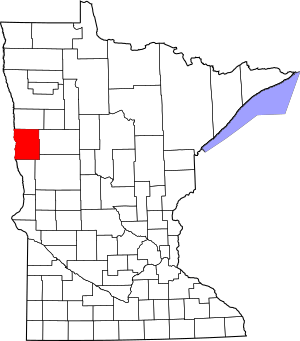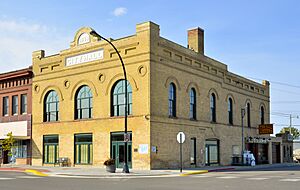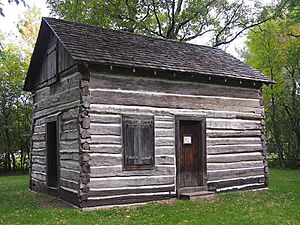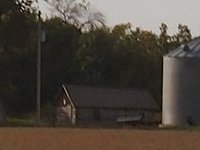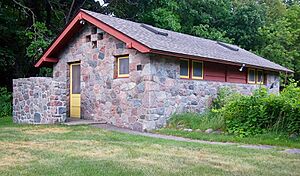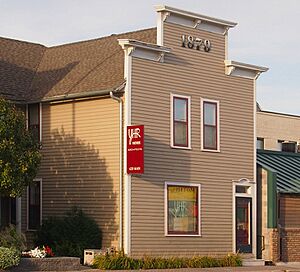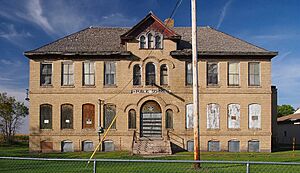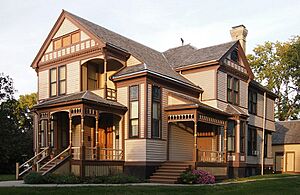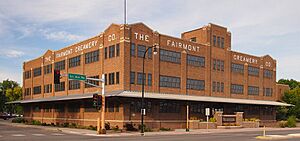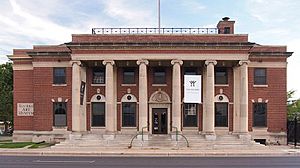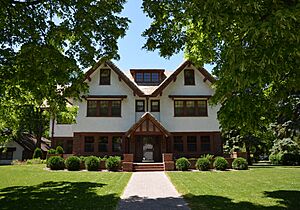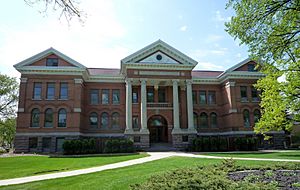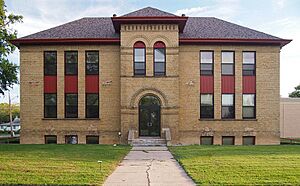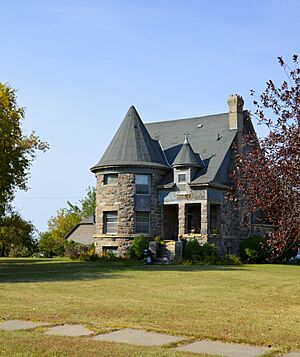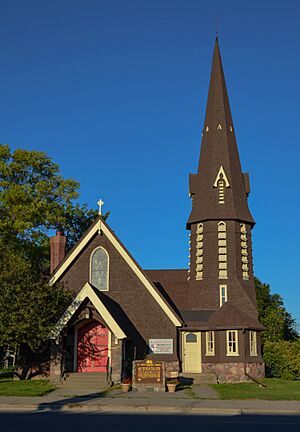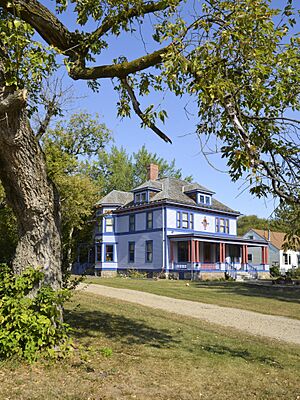National Register of Historic Places listings in Clay County, Minnesota facts for kids
This page lists special places in Clay County, Minnesota that are part of the National Register of Historic Places. The National Register is like an official list of buildings, sites, and objects in the United States that are important to history. These places are kept safe and remembered for future generations.
There are 19 historic places in Clay County on this list.
Contents
- History of Clay County's Historic Places
- Historic Places You Can Find in Clay County
- Barnesville City Hall and Jail
- John Bergquist House
- Bernard Bernhardson House
- Buffalo River State Park Historic Resources
- Burnham Building
- Comstock Public School
- Solomon Gilman Comstock House
- Fairmont Creamery Company
- Federal Courthouse and Post Office (Rourke Art Museum)
- Lew A. Huntoon House
- Wulf C. Krabbenhoft Farmstead
- Main Building, Concordia College
- John Olness House
- Park Elementary School
- Patterson-Hernandez House
- Randolph M. Probstfield House
- St. John the Divine Episcopal Church
- Hannah C. and Peter E. Thompson House
History of Clay County's Historic Places
The historic places in Clay County tell us about its past. This area was important for travel and farming. Early routes included the Red River of the North and the Red River Trails. Not many European settlers lived here at first.
Some of the oldest homes still standing belong to early settlers. These include the Randolph M. Probstfield House, the John Bergquist House, and the Bernard Bernhardson House.
In the early 1870s, two big railroad lines were built. This brought many more people to the area and boosted farming. Moorhead became a very important business center. From the 1870s to the 1920s, huge farms called "bonanza farms" were common. Later, smaller family farms, like the Wulf C. Krabbenhoft Farmstead, became more popular.
Some buildings, like the John Olness House, the Solomon Gilman Comstock House, and the Burnham Building, belonged to people who became successful in buying and selling land or other businesses.
Historic Places You Can Find in Clay County
Barnesville City Hall and Jail
The Barnesville City Hall and Jail is a great example of a small town's main buildings. It includes a city hall, fire station, and even an opera house built in 1899. A jail was added around 1910.
John Bergquist House
The John Bergquist House is a log cabin built in 1870. It belonged to John G. Bergquist, one of the first settlers in Moorhead. He arrived in 1869 and played a big part in Moorhead's early growth.
Bernard Bernhardson House
The Bernard Bernhardson House is another log cabin from 1870. An early homesteader built it as a temporary home. It's the best example of a simple log house from that time in Clay County.
Buffalo River State Park Historic Resources
Buffalo River State Park (Minnesota) has six park buildings constructed between 1937 and 1940. These buildings are important because they show how federal programs helped people find work during the New Deal era. They also show how Minnesota's state parks were developed and feature unique split stone architecture.
Burnham Building
The Burnham Building is the only building left in downtown Moorhead that has a "false-front" design. This design was once very common. It was built around 1880 for Frank Burnham, an early businessman and land speculator.
Comstock Public School
The Comstock Public School building was constructed between 1909 and 1911. It is known for its interesting architecture.
Solomon Gilman Comstock House
The Solomon Gilman Comstock House was built in 1883. It was the home of Solomon Comstock, who helped found Moorhead and was a very important person there from 1871 until he passed away in 1933. This house is also Moorhead's best example of late Victorian architecture. Today, it's a museum run by the Minnesota Historical Society.
Fairmont Creamery Company
The Fairmont Creamery Company building, built in 1923, was a creamery. It helped the Red River Valley region change from growing just one main crop to growing many different kinds of crops. It's also a good example of industrial buildings from the 1920s.
Federal Courthouse and Post Office (Rourke Art Museum)
This building, now known as the Rourke Art Museum, was built in 1915. It's a beautiful Neoclassical building in downtown Moorhead. It's important as a federal government building from that time and for how it was changed and reused for a new purpose.
Lew A. Huntoon House
The Lew A. Huntoon House is the only house in Moorhead built in the English cottage style. It was built in 1910 for the director of the Moorhead State Normal School. Today, it is the official home of the president of Concordia College.
Wulf C. Krabbenhoft Farmstead
The Wulf C. Krabbenhoft Farmstead is a great example of a family farm in the Red River Valley. It has five important buildings that were built between 1890 and 1905.
Main Building, Concordia College
The Main Building, Concordia College is the most famous building at Concordia College. It's also Moorhead's best example of Neoclassical architecture. It was built in 1906.
John Olness House
The John Olness House was built in 1902. It belonged to John Olness, a successful local merchant and land speculator. The house is known for its Neoclassical front and Queen Anne details. It is now used as an event venue called A Friend's House.
Park Elementary School
Park Elementary School (Moorhead, Minnesota) is the oldest school building in Moorhead, built in 1900. It's the only one left of the small neighborhood schools that were used before the big increase in births after World War II.
Patterson-Hernandez House
The Patterson-Hernandez House is a unique and beautifully designed Queen Anne house. It was built between 1898 and 1900 using fieldstone and some wood sections.
Randolph M. Probstfield House
The Randolph M. Probstfield House was built in 1869. It belonged to Randolph M. Probstfield, one of the very first settlers in Clay County. He arrived in 1859 and was a local leader in politics, education, and farming until he passed away in 1911.
St. John the Divine Episcopal Church
St. John the Divine Episcopal Church (Moorhead, Minnesota) was built between 1898 and 1899 in the Shingle Style. It is considered a top architectural landmark in Moorhead. It's also one of the most interesting churches designed by the famous architect Cass Gilbert.
Hannah C. and Peter E. Thompson House
The Hannah C. and Peter E. Thompson House is a Neoclassical house built in 1903. It was designed by the Hancock Brothers for Peter (1852–1905) and Hannah Thompson (1857–1920). They were the founders of Barnesville and important citizens there.


